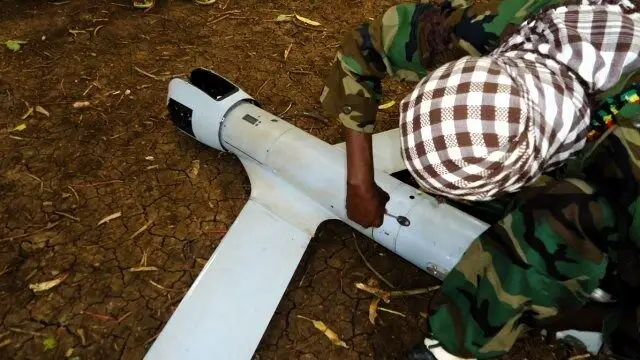As the sun dipped behind the arid horizon of Mafa town in Borno State, Governor Babagana Umara Zulum stood before a crowd of anxious security operatives and community leaders. His tone was grave. His words, urgent.
For the first time, Boko Haram terrorists had reportedly deployed a drone to attack a military formation in the state, a chilling escalation that underscores Nigeria’s growing vulnerability to a new phase of insurgency.
“This is frightening,” Zulum told journalists. “In Dikwa, I was told drones were used. The proliferation of drones, particularly in the hands of non-state actors, is of great concern for the entire country. We have to do something to stop the rampant use of armed drones.”
The governor’s comments followed credible intelligence reports that his own hometown of Mafa could soon be attacked, a fear that reflects not just local anxiety, but national concern about the renewed audacity of Boko Haram and ISWAP fighters across Nigeria’s northeast.
Zulum called on the Federal Government to immediately review the nation’s air safety and defence systems, warning that the drone incident exposed a dangerous gap in the country’s security architecture.
This report, analyses the implications of this new insurgent capability.
For 16 years, Nigeria has battled one of Africa’s deadliest insurgencies. But the use of drones by Boko Haram marks a worrying shift from suicide bombings and ambushes to technologically enabled warfare.
The timing could not be worse. Across the northwest and north-central regions, banditry has intensified. In the southeast, separatist unrest persists. With Boko Haram now testing new aerial tactics, security analysts warn that Nigeria could be facing its most complex national security crisis in years.
On June 21, a female suicide bomber detonated an improvised explosive device (IED) at a fish market in Konduga town, about 25 kilometres southeast of Maiduguri. At least 12 people were killed, making it the first suicide bombing in 2025, after a relative lull last year.
It was a grim reminder of a painful past. Between 2011 and 2017, Nigeria witnessed hundreds of suicide bombings, many carried out by women and girls coerced by Boko Haram. In 2017 alone, there were 127 suicide or attempted suicide bombings, according to the Tony Blair Institute for Global Change.
While such attacks had declined in recent years, thanks to military offensives and internal rifts within Boko Haram recent incidents show that the terror group is reasserting itself, often in more sophisticated and unpredictable ways.
Just days after the Konduga bombing, seven Nigerian soldiers were killed in another Boko Haram ambush in the same area. Several others sustained injuries and were evacuated to nearby hospitals.
In yet another attack, 17 soldiers lost their lives when armed militants stormed three army forward operating bases. The assaults led to prolonged firefights lasting several hours, according to military sources.
“Sadly, some gallant warriors paid the supreme price in the day-long battles,” the army said in a statement, adding that four soldiers were receiving treatment for gunshot wounds.
Earlier, Boko Haram fighters overran a military base in Marte, killing more than 10 soldiers. Witnesses told News Point Nigeria that the attackers seized arms, ammunition, and burnt down several armoured vehicles before retreating into the night.
In August, authorities in Niger Republic announced that they had killed Bakura Doro, the shadowy leader of Boko Haram, in a drone strike on his island headquarters in Lake Chad.
Doro, who took over after the death of Abubakar Shekau in 2021, had maintained a low media profile, quietly rebuilding the group’s networks.
Some experts say that this strategy helped Boko Haram reorganize under the radar, expanding its influence in border communities of Nigeria, Niger, Cameroon, and Chad.
“He shunned propaganda and focused on recruitment and silent consolidation,” observed security analyst Michael Nwankpa in a report for the Hudson Institute.
Even after his death, reports of renewed Boko Haram operations, including mass kidnappings and community massacres have surged in the Lake Chad Basin, raising fears that the group’s leadership vacuum may already have been filled by new hardliners.
The Multinational Joint Task Force (MNJTF), a five-nation military coalition involving Nigeria, Niger, Chad, Cameroon, and Benin was created to combat terrorism in the region.
But the alliance is fraying. Chad withdrew its troops in January 2024, after suffering heavy losses in Barkaram, while Niger’s junta pulled out in April. The remaining partners are stretched thin.
With Cameroon-Nigeria border tensions simmering, experts fear Boko Haram could exploit the rift to reestablish strongholds around Lake Chad.
Governor Zulum’s outcry has resonated nationally. He has long been the most vocal of Nigeria’s northern governors about security sector reforms.
His call for an air defence overhaul comes at a time when President Bola Tinubu is already grappling with multiple internal security challenges from rural banditry to oil theft and separatist violence.
Following the Konduga bombing, Tinubu posted on X (formerly Twitter), condemning the attack as an “attempt to spread fear,” and ordered security agencies to “rout the remnants of Boko Haram.”
Yet, despite repeated assurances of victory, Boko Haram remains resilient, now armed with drones, better intelligence, and renewed ideological fervor.
For millions of Nigerians in the northeast, the return of suicide bombings, military base attacks, and aerial strikes by insurgents signals a painful déjà vu.
“Nigeria may be witnessing the rebirth of Boko Haram a more calculated, more tech-savvy version of its old self,” one intelligence source told News Point Nigeria.
The battle against insurgency, once thought to be waning, now appears far from over. As Zulum warned in Mafa, “We have to come together, federal and state governments, the military and civilians to identify the gaps and fix them.”
Sixteen years on, Nigeria’s war against Boko Haram has entered a dangerous new phase, one that hovers ominously in the skies above.
- Investigations and analysis by the News Point Nigeria security desk. Additional reporting from Borno, Abuja, and Maiduguri.
- SOURCE: News Point Nigeria










